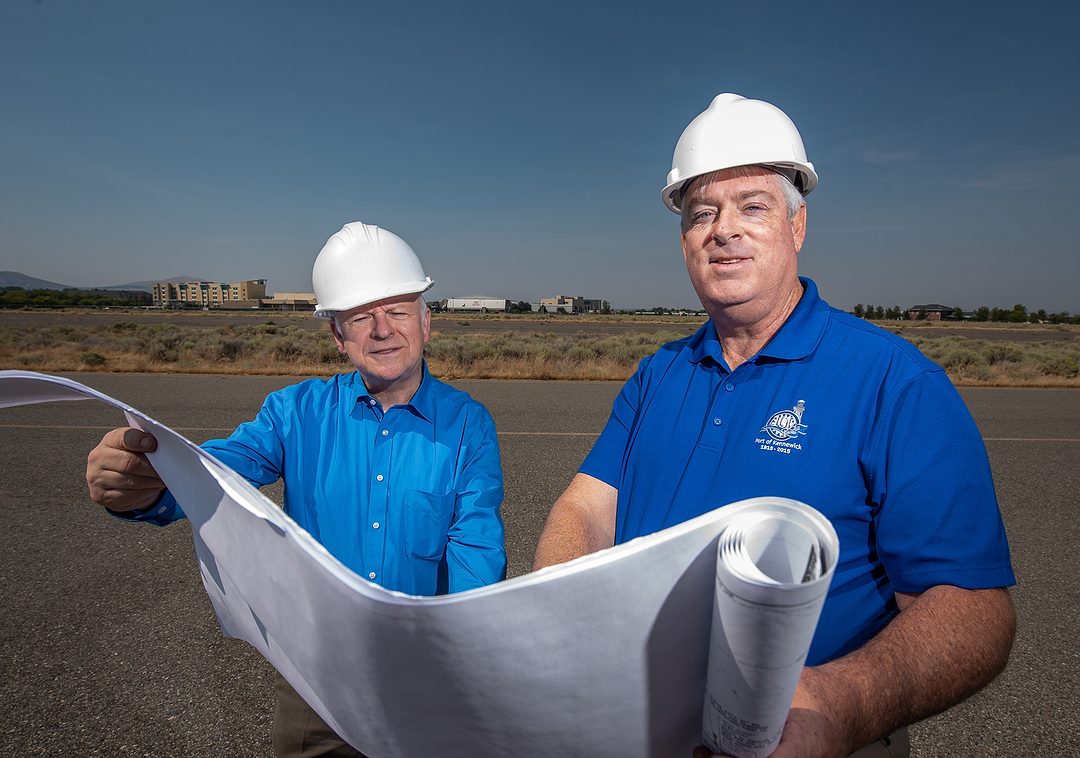
Home » Port of Kennewick: progress continues on Columbia Gardens, Vista Field
Port of Kennewick: progress continues on Columbia Gardens, Vista Field

October 30, 2018
The Port of Kennewick’s two biggest development projects aim to turn high-profile properties into thriving, multi-use areas that offer a sense of community.
The port plans to seek bids by the end of 2018 for the first phase of the Vista Field redevelopment project, while the construction of infrastructure to support the second phase of Columbia Gardens Wine and Artisan Village is to be completed fall 2018.
A municipal corporation serving taxpayers in Kennewick, Richland, West Richland, and portions of Benton City and unincorporated Benton County, the port expects to collect more than $4 million in property taxes, at a rate of 33 cents per $1,000 of assessed property, in 2018.
This supported a biennial 2017-18 total budget of $7.9 million and capital budget of $11.6 million.
Columbia Gardens
The Vista Field plans stem from successful ideas implemented at the port’s Columbia Gardens Wine and Artisan Village on Columbia Drive in Kennewick.
Bartholomew Winery and Palencia Wine Co. opened there in fall 2017.
Now the port wants to bring in food offerings.
Swampy’s BBQ and Frost Me Sweet will be the first two food truck tenants to lease space at the new food truck plaza.
The plaza, along the Sacagawea Heritage Trail, features scenic views of Duffy’s Pond. Food truck spots are equipped with 50-amp electric pedestals and grey-water sewage dumps. They are served by an adjacent potable water hydrant, common area dumpster and grease-dump station to enable tenants to remain on-site long-term.
In addition, a second 2,500-square-foot tasting room building will be completed in spring 2019.
Cave B and Gordon Brothers wineries will open tasting rooms there in spring 2019, said Tana Bader Inglima, the port’s deputy chief executive officer.
Two electric vehicle charging stations and a safe pedestrian road crossing also are a part of the second phase.
“We’re setting the table so we have the remaining 4.5 acres available for sale and or lease,” said Larry Peterson, director of planning and development for the port.
He added that since Columbia Gardens began taking shape, the port has observed increased occupancy in neighboring commercial space, including the opening of Rustica Interior and ET Estate Sales’ move from the Uptown Shopping Center to Columbia Drive.
“When the private sector starts making investments across the street, that’s an indication that the effort is yielding (results),” Peterson said.
Bader Inglima said plans for Columbia Basin College’s culinary school are still moving forward for the third phase of the project, called The Willows, while the port continues to work with a neighboring landowner to complete the final portion of the Sacagawea Heritage Trail to make it continuous.
Across the pond at Clover Island, the port is working with the Army Corp of Engineers on a continuation of the shoreline stabilization project, which began on the west shore of the island. By the end of 2018, the port hopes to know the extent of the work that will need to be completed.
Vista Field
The port owns 539 acres within its 485-square-mile district, including the 103-acre site of the former Vista Field airport, which is due to undergo redevelopment into an urban, mixed-use, pedestrian-focused area to serve as a “nucleus for art in the Tri-Cities,” Peterson said.

The port has secured funding for phase 1-A of the project: a 15-year loan for $5 million through Cashmere Valley Bank.
The port will target the middle 22 acres of Vista Field in the first phase, which will include infrastructure, a park with a cascading water feature that will parallel a road connecting Deschutes Avenue to Grandridge Boulevard, a parking lot that will use a portion of the original airport taxi-lanes, and a plaza to serve as the foundation for the site’s first retail development.
Funding for phase 1-B, which will cover the conversion of existing hangars into port-managed retail or dining space, is still in the works.
The port hopes to attract food trucks and pop-up retailers to this plaza, which will feature a small stage for public performances and dually serve as a launch pad for future businesses.
As the land surrounding the plaza is developed into permanent structures, Peterson said the food trucks and pop-up retail will move to the frontlines of new development with each successive phase.
“It’s not just 1,100 new residences, it’s not just about the 700,000 new square feet of commercial space. It’s the place,” Peterson said. “Placemaking is what we’re after and the way you accomplish that is through conscientious decisions and design.”
Placemaking is a multi-faceted approach to plan for public spaces that improve connections between people and the places they share.
The majority of the Vista Field redevelopment will consist of private sector investment and conversion of available parcels. An estimated half-billion dollars of private investment is anticipated at full build-out, which could take about 20 years depending on market demand.
Construction + Real Estate
KEYWORDS october 2018




